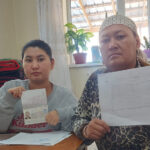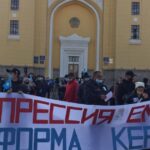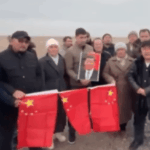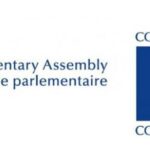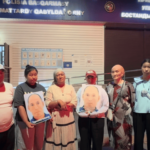Instead of the criminal article “Slander” transferred to the Code of Administrative Offenses in Kazakhstan, the journalists, bloggers and civil activists are now accused on alternative charges.
On July 20, Danaya Kalieva and Marat Turymbetov were detained in Almaty. The soldiers of the special police forces and officers from department combating extremism brought a single mother of many children and a disabled person to the police department. All office equipment and mobile devices were seized from their apartments including children’s phones.
This ‘masquerade’ was organized by the request of the heads of Housing Construction Saving Bank of Kazakhstan, filed back in April 2020. They were offended by social networks publications about inflated expenses on personal needs and, as the authors considered, non-core spending. The bank was initially created with the budgetary funds attraction and its activities are officially aimed at helping poor residents who cannot afford mortgage housing at regular interest rates.
Two authors posted 32 publications with calculations of the spending of financial institution’s employees according to the official website of the bank. This became the reason for the police to initiate a case under Article 274 of the Penal Code of the Republic of Kazakhstan “Dissemination of Knowingly False Information”; moreover, under its reinforced fourth part, “in the conditions of emergency situation”.
According to the activists, the bank procurement plan was tricky from the start: the same lots were divided into many parts so that it would not seem that the amount was overstated; in other cases, seemingly non-identical services were purchased from a single source. In addition, the bloggers did not overlook such expenses as “the lease of sports and training facilities” or purchase of coffee for the head office for $5,000. Moreover, according to activists, advertising and PR services (funded by almost $400,000) are not required for the monopolist bank, where people open the accounts from despair.
Despite the fact that the publications did not cause financial or other shocks in the society, the police demonstrated their enthusiasm, which ended up very quickly. The expertise quickly showed that the publications “contain negative information”. However, the case goes under the Article on “Knowingly False Information”, and this is a problem, since the bloggers received all the information from the Housing Construction Saving Bank itself. In addition, it is everyone’s right to positively or negatively assess the activities of a financial institution.
Currently, police investigator Gizat Kazhibaev allegedly handed over all the seized equipment and devices for examination. Danaya Kalieva and Marat Turymbetov are witnesses in the case with the right to defense, and in this case, the law does not provide that a takedown team should be involved in detainment of the witnesses, as well as the seizure of the equipment.
According to Danaya Kalieva, there may be an element of politics here.
“Now, I cannot determine whether it was done by the decision of the bank or the politician, because the chairman of the bank is a member of the political council of the ruling party. It is difficult to sort the wheat from the chaff when it is all one. The bank is a part of this system, it is a subsidiary of the Baiterek holding, and all state housing programs pass through it,” Kalieva notes.
The website of the Housing Construction Saving Bank indicates that it is a member of two international organisations and it signed memorandums of cooperation with three others. We addressed for comments on how the bank’s activities meet the criteria for membership in the international institutions. The answer was received only from the International Finance Corporation (IFC, part of the World Bank Group), with which a memorandum was signed, as the bank’s website states.
“IFC does not approve any actions from our clients that could be considered as retaliation,” states the response signed by the Regional Communication Officer Kymbyt Ibishova.
To prove it, it is suggested to read the “IFC Position Statement on Retaliation Against Civil Society and Project Stakeholders”. It also states, “IFC does not tolerate any action by an IFC client that amounts to retaliation – including threats, intimidation, harassment, or violence – against those who voice their opinion regarding the activities of IFC or our clients. We take seriously any credible allegations of reprisals”.
The response also stated that the Housing Construction Saving Bank is no longer an IFC client, but for some reason, this was not noted on the bank’s website.
In total, Danaya Kalieva and Marat Turymbetov counted the bank’s non-core or figuratively core expenses for almost $3.7 million, which may affect interest rates for bank borrowers.
At the same time, the bank considered it necessary to share another achievement with everyone. In 2020, the crisis year, the bank managed to raise funds in the amount of $636,000 to reward seven members of the bank’s executive body, including its chairman, a member of the Nur Otan party Lyazzat Ibragimova.
By the way, Danaya Kalieva already had experience with Article 274 of the Kazakhstan’s Penal Code. In May 2020, she was interrogated for another alleged dissemination of knowingly false information in the conditions of emergency situation. The claimant was the construction oligarch Aydin Rakhimbayev, the owner of the BI-group Corporation. Then, the key reason was Danaya’s doubts about the cost of hospitals specially built for coronavirus patients. However, that case did not gain traction further.
Article With an Individual Approach
The investigator of the police department Mr. Kuzenbay has even more difficulties.
On August 27 this year, Almaty blogger Anton Budarov, the manager of the YouTube project “Civil Patrol – Kazakhstan”, was first interrogated under another initiated case under Article 274. His video titled “The House of Police Bribe-Taker” (published on August 23), is based on video posted by the Anti-Corruption Agency, whose officers detained the head of the processing center of the Almaty Police Department while receiving a bribe. Anton Budarov added drone footage of the policeman’s mansion to the material and tried to speak with his wife.
Someone from the inner circle of the arrested law enforcement officer filed the lawsuit, as the blogger suggests. However, he also does not exclude the interest of a “third party”, since on August 19, the results of the mini-investigation on the cost of capital repairs of Almaty pedestrian zones were published on his channel. The Etalon plant director and the member of the Almaty maslikhat (city council) won the tender for this profitable project.
Unlike in case of Turymbetov and Kaliyeva, the equipment was not seized from Anton Budarov; only this and other videos from his channel were given for examination, and now, according to the blogger, “he goes to interrogations as to work”.
“Now, they [the police – Budarov] will check me at all levels: whether I have any connections with the Anti-Corruption Agency, the National Security Committee and so on. They will test all my contacts first,” says Budarov, who signed an agreement not to disclose the details of the criminal case.
This April, Arman Shuraev, media manager, public figure and former member of the National Council of Public Trust under President Tokayev, was detained for several days for speaking out about the family of the first President of Kazakhstan Nursultan Nazarbayev in Exclusive.kz interview. He was provided the opportunity to publish a remorse to close the case.
The most widely discussed case in recent years, linked with the fourth part of Article 274, was the case of a public figure Alnur Ilyashev from Almaty. On June 23, he was released from the prison, where he spent two months for three Facebook posts about the ruling Nur Otan party. He was sentenced to three years of imprisonment, followed by a ban on social activities and publication on social networks for such phrases as “a party of crooks and thieves” and “the mountain gave birth to a mouse”.
On September 15, the Almaty city court upheld the verdict. The presiding judge Lyudmila Bektemirova explained her decision as follows:
“Considering the situation with coronavirus at a time when people were literally panicking, your posts, of course, had a negative effect. Therefore, we concluded that you are guilty.”
At the same time, she allowed Ilyashev to apply to international organisations to defend his position, although international organisations reacted to this case already.
“Alnur Ilyashev’s sentencing under absurd charges is a clear sign that it is business as usual in Kazakhstan and no independent voices will be permitted to criticize the government’s policies and actions. Any violation of the terms of the sentence will mean that Alnur Ilyashev will be imprisoned. On hearing the verdict, he asked to remain in prison,” stated Heather McGill, Amnesty International’s Central Asia Researcher.
The US Department of State also called on the Kazakh authorities to “restore his full rights as a citizen of Kazakhstan and allow all citizens to express their opinions without fear of arrest or reprisals”.
Shortly before the appeal proceedings, the Foundation of the American movie star George Clooney also stood up for Alnur Ilyashev. Their advisory preliminary report by the American Bar Association pointed out to the Kazakh authorities the numerous violations in this case and called on the “government of Kazakhstan to ensure that Mr. Ilyashev can exercise his right to freedom of expression, including the right to publicly criticize the ruling Nur Otan Party, and to allow him to fully participate in political and public life”.
In turn, the civil activists in Almaty tried to turn the new tool towards the police and officials.
On May 25, a drunk driver rammed a checkpoint, and two police officers died due to injuries. It turned out that the guilty driver previously worked in the police and was fired for negative reasons. However, the press secretary of the Almaty Police Department Saltanat Azirbek tried to hide this circumstance, calling it “false information”. Reacting to the provided photos of a former police officer in the uniform, she told that anyone could buy it at the army surplus store. Azirbek was punished as a disciplinary measure, but no grounds were found for initiating a case under Article 274.
Another attempt was made against the former Deputy Mayor of Almaty Saparbek Tuyakbaev. Svetlana Druzhinina filed a lawsuit against the official who claimed that there was no shortage of medicines in pharmacies during the epidemic, while the queues at pharmacies and the panic about the lack of basic medicines proved the opposite. The police returned her complaint without finding the “grounds for consideration”.
Witch-Hunting Was Not Avoided
The Article 274 of the Penal Code of Kazakhstan, which no one remembered about previously, suddenly became popular after the President Kassym-Jomart Tokayev on June 27, 2020, allowed to transfer the article “Slander” from the Penal to the Administrative Code, thereby allegedly making concessions to the demands of the international community.
In total, during the first eight months of 2020, according to the Committee on Legal Statistics and Special Records of the General Prosecutor’s Office, 81 cases were registered under Article 274. Of these, five went to court.
In addition, the coronavirus pandemic and the introduced emergency during two months brought to life other previously unused articles aimed at suppressing the activity of civil society and journalists.
At the end of April, the Karaganda taxi driver Arman Khasenov was sentenced to three years of imprisonment. He was charged under the Article “Public insult and other infringement on honour and dignity of the First President of the Republic of Kazakhstan – Leader of the Nation” for a published video where he criticized the reaction of the authorities, Nursultan Nazarbayev in particular, during the coronavirus pandemic.
In the administrative field, the Article 478 “Actions provoking the violation of legal order in emergency conditions” was discovered. In Aktobe, in April, two human rights defenders from the Qaharman Foundation were charged under this Articles with fines for their publications from two months ago. They reported about the mass hunger strike of people held in the reception center for the administratively arrested. The very fact of the hunger strike was not contested.
On April 19, 2020, when everything just began, the Adil Soz Foundation for Protection of Freedom of Speech issued a statement regarding the arbitrary application of Article 274 and called on the General Prosecutor’s Office to control the initiated cases.
“Of course, there are fake, provocative publications; there are gloomy and even panic forecasts. There are much more unintentional mistakes and controversial opinions that cannot be qualified as a crime in any way. It is possible and necessary to neutralize or correct them by opposing reliable and diverse information, public discussions and open polemics. However, detentions, arrests, imprisonment and other intimidating actions are capable of creating even greater anxiety and panic instead of the longed-for stability and throwing the civilizational development of the country back for many years,” says the document entitled “Preventing a Witch-Hunting During Emergency”.
Over time, it became obvious that the ‘witch-hunting’ proceeds at full speed.
SOURCE:
Cabar.Asia
https://cabar.asia/en/kazakhstan-emergency-triggered-witch-hunting#



